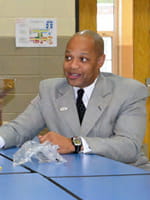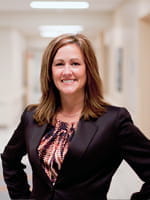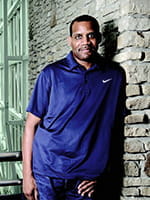At work and in the community, alumni are making an impact—and finding meaning—by mentoring. Here, three alumni share lessons you can apply to your own life.
Mentoring sticks. Connections click. Lessons last. When calls continue, bonds stay strong. Most of all, mentoring motivates. Just ask Debbie Pender, the hospital vice president who found her first mentor in a night-shift nursing colleague nearly 30 years ago. Or Ralphfiel Farrar, whose one-year commitment to a program for African-American and Latino teens earned him honors and an ongoing volunteer role. Or Dr. Curtis Alston, the educator who saw boys struggling socially and academically and started a school-based mentoring program. These three alumni are among the many Walden graduates who recognize that mentoring matters—in schools, in communities, in the workplace, and in their own lives.
Helping Boys Thrive in School

Dr. Curtis Alston.
Photo credit:
Reflections by Christina.
Your environment does not dictate the outcome of your life. That’s what Dr. Curtis Alston ’13 told himself as a boy, growing up in Boston in a single-parent household in a high-crime neighborhood. “When I was a grade-school student, a teacher told me that because I was African American and male, I should forget my dreams, that I probably wouldn’t finish high school, and I would likely end up in jail,” Alston says. “That motivated me.”
Determined to defy the teacher’s low expectations, Alston found three mentors. “They taught me that you can be whatever you set your heart on being,” he recalls.
Those mentors’ messages stayed with Alston when he became a Maryland middle school teacher. Working with his principal, he created a plan for a school-based mentoring program for young male students—and made it a reality. Called Gentlemen on a Mission, the program provides positive role models and guidance for boys who are at risk both academically and socially.
“These are the kids who act out, disrupt class, and assert their will. They have influence but don’t know what to do with their natural leadership abilities,” says Alston. “Through this program, we give them leadership positions by asking them to be hallway monitors. We also require them to complete community service so the positive behavior extends beyond our school. The program has shown a reduction in office referrals and an increase in academic performance.”
As he moved on to teach at other Maryland schools and into administration roles, Alston established additional chapters of the program—and began earning his Doctor of Education (EdD). He launched a chapter immediately upon joining Lexington Park Elementary School in St. Mary’s County, Md., where he is now principal. Parents clamored to extend the mentoring program to the middle school as their sons grew older; a high school chapter is next.
Oprah Winfrey also noticed Gentlemen on a Mission, highlighting it on her show. Calls followed from schools across the United States and as far away as South America. Every chapter Alston has started is still in place, led by the mentors he trained to take over. “Any program you build has to outlive you,” he explains. “I train and run the chapter the first year, but then I back off. As a result, the program stays strong.”
Alston also remains part of the students’ lives. “The boys I started with are now grown men and 75% of them still contact me once a month,” he says. “They say, ‘Thank you, Dr. Alston. If not for you, I wouldn’t be in college,’ or ‘I wouldn’t have direction.’ There are many success stories.”
More than anecdotes validate the mentoring program’s success. With encouragement from Walden faculty member Dr. Joe Ann Hinrichs, Alston focused his doctoral study on Gentlemen on a Mission, with Hinrichs as his chair. “I consider her my first female mentor,” he says. “At my first residency, she asked a group to speak about their life’s passion. She was so moved by what I said about mentorship that she said she’d be honored to serve as my doctoral study chair. As a result, we developed a phenomenal friendship.”
Alston’s research findings are helping to strengthen the mentoring program. For example, he says, “A survey showed that the boys were in class more of the time because of the social aspect of the program, but they were still struggling. When I did a literature review, I saw a lot of mentoring programs have a strong academic component. My doctoral study helped me flesh out the academic core of our mentoring program. We now dedicate the first half an hour of each meeting to reading and math strategies.”
It’s also led to new growth. “I shared my doctoral findings with our superintendent and he was so impressed that he wants the mentoring program at every school in the district,” Alston explains. “The program at our school will be a model other schools can modify for their needs and student populations. There will also be a program for girls. This is not just a mentoring program for me,” he says. “This is my life, and I’m going to take it as far as I can.”
Working as a Mentor and a Mentee

Debbie Pender.
Mentors kept Debbie Pender ’13 in nursing when she was wavering, served as leadership role models, and gave her strategies to succeed. Now, Pender is the vice president of nursing at the same Oklahoma hospital where she was a nursing student almost 30 years ago.
“My organization is oriented toward growth and mentorship, but mentoring is something I also believe in personally,” says Pender, who was promoted to vice president of Mercy Hospital Ardmore last June and marked another major milestone in 2013 by earning her MBA with a specialization in Healthcare Management.
Pender’s predecessor groomed her for her new role in senior management. The former vice president involved her in meetings and projects that provided her with opportunities to grow. “She mentored me to be the next vice president of nursing because she saw I had the ability,” Pender says. “She exposed me to situations that were new to me, including meetings with the physicians when we were expanding our services.”
As a registered nurse, nursing instructor, director, and senior hospital administrator, Pender has developed relationships with peers and supervisors who offered professional guidance and encouragement that many people would consider mentoring. Pender personally believes a mentoring relationship runs deeper.
“A mentor can be intrinsic. A connection develops with someone within your expertise or even another department. You have someone who’s invested in you as a person. There’s a desire to see you succeed and grow. When you have a mentor, you learn what kind of professional you want to be and how you want to lead,” Pender says. “It’s rare to find a true mentoring relationship. You have to be open to mentorship and foster it as a mentor and a mentee. If you already have a working relationship with someone, have a conversation about wanting to be a mentor—or to become a mentee.”
To Pender, mentoring is part of being a leader. She shares what she’s learned on her path to a vice presidency with others at her hospital, including a nurse manager who succeeded her as nursing director and considers Pender a mentor.
Pender believes her own degree from Walden helps her guide a wider circle of hospital staff members. “My degree has had a positive impact on my ability to mentor,” she says. “I’ve set an example for my mentees by being a lifelong learner and moving from nursing to business.”
Though her new role is demanding, Pender remains committed to mentoring. “If it’s something you value, you make the time, even if it’s challenging. Mentoring can be a phone call; it can be strategizing with someone in your office for an hour; it can also be as simple as recommending a book to read.” Pender concludes, “I’m where I am today because I had mentors along the way.”
Challenging Teens to Succeed

Ralphiel Farrar.
Photo credit: Art Dickinson.
Ralphfiel Farrar’s manager was the first to realize his potential impact. A senior recruiting specialist for Johnson & Johnson Global Recruiting Services, Farrar was a long-time basketball coach, active at his church, and involved with a school program for at-risk children. He was the ideal choice to represent his company as a business mentor in the Black and Latino Achievers program at the YMCA of Greater Cincinnati in Ohio.
Today, Farrar ’08 is part of a team of local business leaders who mentor teens through the YMCA’s program. There, they teach skills such as setting goals, writing a résumé, interviewing for a job, and budgeting for college. His required commitment is one hour per month, but Farrar chose to make it six.
“Mentoring is not about you—it’s about the person you’re mentoring, and you need to establish a connection,” he explains. “Kids will know if you’ve made a real commitment. The kids know I will be there.”
Farrar welcomed the opportunity to be both a mentor and role model to the teens since it reminded him of his own childhood experiences. “I always tell my mentees the story of my upbringing,” he explains. “I lived in a housing project. My family didn’t have a lot, yet I never saw my situation as my destination. My dad was my biggest motivator. I had an opportunity to go to a prestigious prep school and worked hard to get where I am today. I feel very strongly about giving back, and I’ve always been the type of person to encourage others.”
His experiences in the BS in Business Administration program at Walden also motivated him. “The classes on social change and ethical leadership and the overall experience helped me bond to the Walden community,” Farrar explains. “Everyone at Walden is a strong advocate of social change. Seeing what other alumni were doing made me start to think about what I could do.”
In just one year as a volunteer with the YMCA program, Farrar discovered how much he could do as a mentor. “I challenge students to think bigger when they consider their career aspirations and provide them with industry knowledge,” he says. “I knew I was making a difference when someone came to me and said, ‘I got the job because I asked the questions you told me to ask about the team, hours, and management style—and was told that was the differentiator between me and the other candidates.’ That gave me a good feeling.”
Others also noticed Farrar’s impact. The YMCA recognized him at its annual salute to the Black and Latino Achievers Program in 2012. His dedication to mentorship also earned him recognition at his business. His company nominated him for the national African American Leadership Council Leadership Award—and he won.
“The award put me in the spotlight. Now I’ve been asked to help make the program even stronger,” says Farrar. “I want to see the kids succeed. Five years from today, I want to be able to talk about each of their outcomes.”
The Making of Mentors
Whether you want to mentor others or seek someone to guide you, three alumni offer a few tips to help you get started.
As a Volunteer
FIND YOUR PLACE. “Go to your local school, church, or look for an established program,” says Dr. Curtis Alston. “Schools are always looking for mentors, even if they don’t have a set program.” Ralphfiel Farrar agrees. “Uncover a need, and you’ll find your passion,” he says.
START SMALL. Be realistic about the time you can devote to mentoring. “Take baby steps,” says Farrar, who recommends mentors set clear expectations about the time they will dedicate and make an effort to communicate that clearly.
SET GOALS. Milestones will give purpose to your meetings with mentees. “Set goals, timelines, and milestones so you, your mentees, and other stakeholders in their lives can see their progress,” Alston says.
STAY ENGAGED. “You have to commit to being a presence in the lives of kids who need that constant voice,” says Alston. “You have to make sure they reach their pinnacle.”
In the Workplace
CHEMISTRY COUNTS. Respect and support are crucial, but personal chemistry is another factor. “Finding a mentoring relationship is a journey,” Debbie Pender explains. “If an ingredient is missing, you’ll know it.”
BE DIRECT. “It’s OK to say you’re looking for a mentor,” Pender says. “Seek out people with similar day-to-day experiences.”
BE RECEPTIVE. Whether you’re asked to become a mentor or find yourself assuming this role, be open. “Everyone has something to offer,” Pender says. “Seeing others develop is one of the most rewarding parts of my job.” — A.D.



